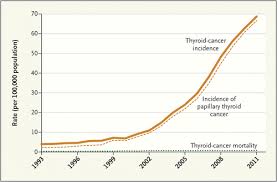The thyroid cancer rate has doubled or possible tripled in the last twenty years in most Western countries; however there’s a paradigmatic case, according to an article published in New England by Ahn HS and collaborators: South Korea, where this rate has multiplied by fifteen. What has happened in this country? Is there an epidemic? This should not be the case given that when experts analyse specific population mortality (as shown in the chart), this figure remains unchanged. Therefore, everything points to a spectacular case of national over-diagnosis.
The authors explain that many government-encouraged providers offer very attractive and widely accepted preventive packs, including the use of ultrasound and other more sophisticated imaging tests for the early detection of thyroid cancer. It should be clarified that in South Korea, despite there being a national health system, there are co-payments for almost all health activities and as a consequence people pay close attention to the price of combined service offerings.
According to experts, the increase in the incidence of thyroid cancer is almost exclusively due to the papillary type, a relatively mild form of cancer. Despite this, the data of therapeutic activity that derive from the 40,000 cases diagnosed in 2011 in South Korea is chilling: 30,000 of these people underwent radical thyroidectomy so all of them should receive hormone replacement therapy forever; in addition to having detected that about 3,000 will suffer hyperparathyroidism and about 600 have ended up voiceless due to the paralysis of the vocal cords as a side effect of the intervention. In a climate of preventive anxiety, therapeutic over-activity is being served regardless of the following data: despite the recommendations of the clinical practice guidelines, a quarter of the operated tumours measure less than five millimetres in diameter.
A lesson should be drawn from the case of overdiagnosis of thyroid cancer in South Korea: don't encourage the screening of this cancer to avoid regrets about the side effects that are being seen in that country.
Jordi Varela
Editor



No comments:
Post a Comment